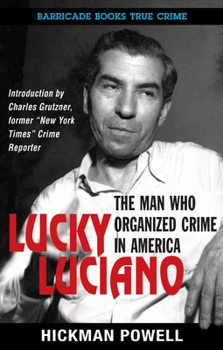Lucky Luciano: The Man Who Organized Crime in America
Select Format
Select Condition 
Book Overview
Father of Organized Crime, Lucky Luciano--born poor in Sicily, came to New York's Lower East Side in the early 1920s. His pals were Irish, Jewish and Italian's criminals. During WWII, Lucky made a deal with the US Government freeing him from prison, returning to Italy, working for the Allies. At war's end back in America his Cuban Casino connection made him persona non grata. Lucky was behind the infamous Atlantic City gathering of top US mobsters including Al Capone, Meyer Lansky and Frank Costello. They ran crime as a business, structured by Luciano as the "Cosa
Nostra." Lansky's statement, "We're bigger than General Motors," became part of gangster lore. An incisive portrait of then prosecuting attorney Thomas E. Dewey whose efforts resulted in Luciano's conviction. This portrait of Organized Crime, was written by top reporter who followed the trial up to the jury verdict, interviewing Luciano, and the prostitutes and pimps who testified against him.
Nostra." Lansky's statement, "We're bigger than General Motors," became part of gangster lore. An incisive portrait of then prosecuting attorney Thomas E. Dewey whose efforts resulted in Luciano's conviction. This portrait of Organized Crime, was written by top reporter who followed the trial up to the jury verdict, interviewing Luciano, and the prostitutes and pimps who testified against him.
Format:Paperback
Language:English
ISBN:1569809003
ISBN13:9781569809006
Release Date:March 2015
Publisher:Barricade Books
Length:356 Pages
Weight:1.10 lbs.
Dimensions:1.0" x 5.2" x 8.2"
Customer Reviews
2 ratings
A Wonderful Piece of History
Published by Thriftbooks.com User , 19 years ago
OK, some of you may be misled by the title, expecting an in-depth "biog" as one self-styled "Prince" put it, but what we have here is a wonderful contemporary view of Luciano's trial and his history and the 20s and 30s racket scene as it was viewed by his contemporary New Yorkers. Of course there's nothing on Lansky and Siegel--they were unknowns at the time, just as Luciano was until the time of his trial. Of course there's nothing on Luciano's wartime collaboration with the military, or his subsequent deportation--because these things hadn't happened yet! Of course Dewey used Luciano to further his own political ambitions--so what? As for his children, which one reviewer inquires about, Lucky never married and is never known to have produced any. If you're interested in Thirties crime though, here is a Thirties view of it that is about as fresh as you're likely to find anywhere. At least it'll do until Ellen's book comes out and it still beats the fiction of Gosch's "Last Testament".
A Noted Secondary Source
Published by Thriftbooks.com User , 21 years ago
Powell's documentation is basically correct based on the bare facts of the story found in New York City tabloid newspapers and in archived files. As such, it is a rare secondary source into the lives and legends of the prostitutes, bookers and madams who formed the web of prostitution used at Prosecutor Thomas Dewey's behest to convict the elusive Charlie Lucky. Originally written in the 1930s, Powell's prose reveals the language of old-style morality which was required in the days of censorship. As such, it is a time-capsule of the social mores governing prostitution. While crime historians focus on Lucky's later years, this jewel preserves the trial data that forced Luciano from the shadows.





